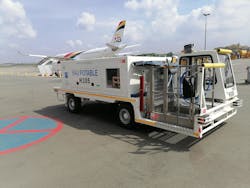With near-term and long-term plans to reduce its environmental impact, officials at Brussels South Charleroi Airport in Belgium recently accepted delivery of electric ground support equipment (eGSE) units manufactured by Aviogei Airport Equipment.
Looking to achieve the goals outlined in the Sustainability Strategy for Airports document approved by the board of Airports Council International (ACI) Europe, Brussels South Charleroi Airport (BSCA) has vowed to reduce its emissions to 0 net grams of carbon dioxide (CO2) by 2050. As a more immediate commitment, BSCA is striving to reduce its CO2 emissions by at least 35 percent by 2030 and compensate the remaining emissions through sustainable projects.
“The goal of BSCA is to have only electrical vehicles,” explained Fabrice Wybo, head of ramp training for BSCA, noting the airport has a target of changing out all of its GSE to electric units by 2033. “We have a sustainability manager in charge of ISO 14001. All the activity must be green, low emission, pushing conversion of the engine ... to electrical.”
The airport has two self-propelled passenger stairs equipped with a ramp chair lift as well as potable water service unit from Aviogei.
Aviogei’s potable water supply vehicle, the VASM 1500E, is an electric-powered unit capable of furnishing all wide-body aircraft, including the A330, A340 and B777, with drinking water. The VASM 1500E features a lithium battery with a remote control system, high performance water pump and antifreeze temperature control system.
Wybo said BSCA is satisfied with the VASM 1500E, noting its compliance with all International Air Transport Association (IATA) requirements in terms of operations and safety of the vehicle, including the possible interactions inside the airport area.
“For us, the safety is essential and addresses our choice of the GSE,” Wybo added. “The electrical potable water provided by Aviogei Airport Equipment is technologically innovative for the management and control, with fully electric propulsion system.”
Wybo noted the control system utilizes electronic and mechanical sensors, which allow constant vehicle status monitoring and improve efficiency while reducing human error.
“Safety is a primary goal for us. We have to protect our drivers. The prudence is fundamental in the airport area,” he said.
Aviogei officials note their products are customized according to the customer’s needs, and are constantly updated for safety requirements. For example, the company’s eGSE has incorporated an anti-collision system.
“The main benefits of the eGSE are the little consumption, reduced operative and maintenance costs, optimum comfort for the operators, diagnostic system that permits a fast identification of the failures,” Aviogei company officials say, adding eGSE operates more quietly because of the electric engine propulsion.
What’s more, the eGSE has a frontal system platform, allowing additional usability and safety advantages.
In BSCA’s ambition to reduce its environmental impact and become carbon neutral by 2050, Pierre De Deroubaix, maintenance and infrastructure manager at BSCA, says additional alternative energy equipment will be sought.
“To assume this objective we will continue the conversion of our fleet into the next year,” he said, noting electrical and likely hydrogen powered equipment can assist with this goal.
Officials at Aviogei say the company pays close attention to sustainability when seeking solutions for its customers.
Beyond the VASM 1500E, Aviogei is expanding its electric range of GSE after finding success with electric-powered ambulifts.
“We have also the toilet lavatory service unit. The next product line is the cargo loader, on which we are proceeding on the electrification,” Aviogei officials note.



